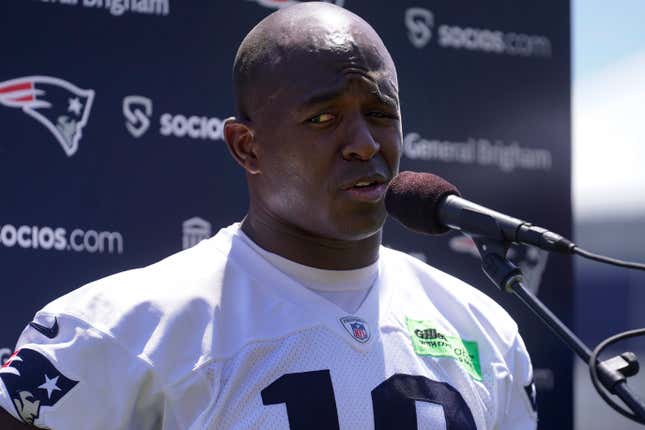
For those curious about the temperature in the room among the NFL players, Matthew Slater gave a good indication of where it is during New England Patriots OTAs on Wednesday. He discussed the league’s new kickoff rule — which Kansas City Chiefs TE Travis Kelce has called “absolutely stupid” — that will be implemented in the 2023 season.
The NFL has been aiming to reduce the number of kickoff attempts for years. This new rule will make the play even less a part of the game. Regardless of where the return specialist is when he calls for a fair catch, the ball will now be placed at the receiving team’s 25-yard line. Being that Slater is a 10-time Pro Bowler as a special teamer, he is naturally going to be a bit biased. However, it’s hard to argue against his opinion that the way that the NFL goes about player safety is largely window dressing.
“I’m just not convinced that our league is always gonna do what’s in the best interest of our players,” Slater told the media. “I understand that we want to reduce head injuries and things of that nature, but we don’t always act as if player health and safety is paramount.
“We can talk about the Thursday Night games. That’s an easy one. That’s low-hanging fruit but we can also talk about the issues that our players experience once they leave the game. Why is it that we have to fight for healthcare beyond five years out of the game? Why is it that when players go to file for benefits, in terms of disability, they’re having to jump through hoops nonstop.”
Slater not convinced NFL going to do what’s in players’ best interests
If the NFL did operate in 100 percent good faith when it comes to player safety, then the league should be alarmed that a 15-year veteran who is one of its most respected players, would be this openly critical. Jakobi Meyers said about him at the end of last season, “If I could grow up and be like him, I’ll be proud of myself.”
Slater has won several awards for leadership and his charitable work off of the field. Bill Belichick is known for letting players go a year too early instead of a year too late. Yet he has continued to keep a special teamer on the roster as one of his captains. Slater will turn 38 years old in September, gain no yards, and cause no third-down stops. Still, the ultimate cold as a Foxborough winter coach sees the value in having Slater on the roster.
An organization should want a veteran like that to be a spokesperson for the league. This hardscrabble, special teams lifer should be called upon for the rest of his life to make appearances at charity events and advertiser functions to extol the values of the NFL.
Instead, he is saying that the NFL’s latest attempt at player safety is hollow. A truly damning indictment of how the league treats its players. Slater is wondering why instead of the NFL pouring all its efforts into making a car crash safe, how about some extensive medical care for the people participating in those collisions and bringing great profit to billionaires.
The answer of course is that it’s cheaper to make the game marginally safer than to actually take financial account for the inevitable damage that it causes. Simple economics: Small policy changes are more profitable than caring for people.
Maybe the NFL will invite Slater on a Zoom call or maybe he’ll have a one-on-one with the commissioner next time he is in Massachusetts. Slater has enough clout in the NFL to where he can at least command an audience.
Actual change though, don’t expect that next month, next year, or next collective bargaining agreement. Because you know who doesn’t expect it? Matthew Slater.